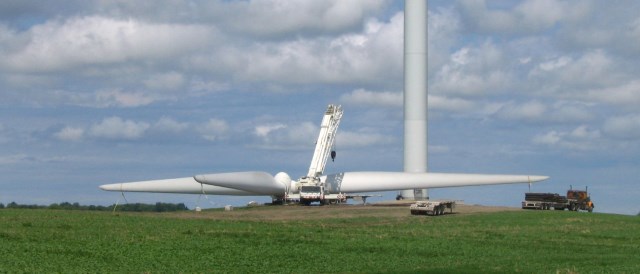In Germany, labor unions are strong supporters of renewables, which is not the case everywhere. A recent paper by a German labor union leader explains the history, which is a good example of the struggle between midsize firms and large corporations, says Craig Morris.

Nowadays, renewables provide far more jobs in Germany than the rest of the energy sector combined. (Photo by Loozrboy, CC BY-SA 2.0)
Recently, I wrote about Strukturwandel (structural change), the German campaign to transition away from conventional heavy-industry sectors to new technologies. I later came across this wonderful PDF in German, and I wanted to share its content with the non-German-speaking world.
The author, Meinhard Geiken, is a leader in IG Metall, Germany’s major labor union for heavy industry. He explains that the union now “promotes democratic structures in future industries” but that labor unions were once fierce opponents of renewables.
Last year, labor unions co-organized the “human chain” of 120,000 people that connected the Brunsbüttel nuclear reactor to the Krümmel reactor in a protest. But as Geiken explains, the labor unions promoted the “peaceful use of nuclear energy” in the 1970s as a way of creating jobs. After all, these unions represented such sectors as the railways, mining, and energy itself.
Geiken says that, during the popular protests against plans to build a new nuclear plant in Wyhl (where the Energiewende movement started in the 1970s), labor unions held a pro-nuclear demonstration in 1976 at the stadium in Dortmund. According to a different report, some 40,000 union members took part in the demonstration. And some labor unions told their members they would be kicked out of the union if they demonstrated against nuclear.
Nonetheless, by 1978 the first members of labor unions started campaigning against nuclear, and by 1981 “several thousand” union members took part in a protest against the construction of the Brokdorf nuclear plant in northern Germany. As Geiken tells the story, the pro-nuclear stance of labor unions – including IG Metall – completely collapsed after Chernobyl in 1986, leading to support for the initial nuclear phaseout of 2001, which he calls a “consensus,” not a “radical phaseout.”
These days, German labor unions understand that far more jobs are to be had from renewables than from nuclear. But things are much different in other countries. Like Germany, the US has no labor union specifically for nuclear, perhaps because labor unions are so weak in the US; this one has a list of nuclear plants showing how often the labor at nuclear plants is non-union. But in the UK, nuclear labor union GMB is campaigning hard for new plants.
In France, the nuclear sector also has its own labor union (CGT), but actually anything that would hurt the bottom line of former French power monopolist EdF (which renewables certainly would) is bound to meet with popular resistance. Since 1946, EdF has devoted one percent of its sales revenue – not profits! – to the CCAS, which uses the money to provide inexpensive restaurants and holiday resorts to union members. Indeed, the French themselves say that the Communist Party would have died long ago in France without these transfers to the CCAS.
The switch to renewables is harder when such vested interests resist all kinds of change. One unsung reason why Germany has been able to transition slowly but consistently to renewables over the past 20+ years is that Germany has so few large corporations and so many mid-size firms. And the energy transition fits right into the structural change that German labor unions have been promoting during the past two decades.
Craig Morris (@PPchef) is the lead author of German Energy Transition. He directs Petite Planète and writes every workday for Renewables International.
The recent decision by Germany to support cheap Chinese solar panel imports (Germany opposes an EU anti-dumping trade lawsuit before the WTO) cannot help either German labor support for renewables or world-wide carbon emissions.
Chinese made solar panels installed in Germany as part of Energiewende require lots of inefficient Chinese coal fired electricity to make. These Chinese panels will take a decade or more of generation in the bright German sun to just balance to zero net carbon.
But the accounting puts the carbon emissions to make the solar panels on China, and the reduced carbon emissions from their generation go to Germany.
http://www.reuters.com/article/2013/05/27/eu-solar-china-idUSB4N0D900Q20130527?feedType=RSS&feedName=marketsNews&rpc=43
[…] efficiency – exactly what Germany is doing – in order to create jobs. Granted, the labor union I complained about (CGT) still remains wedded to nuclear, but the news that its competitor has thrown its weight […]